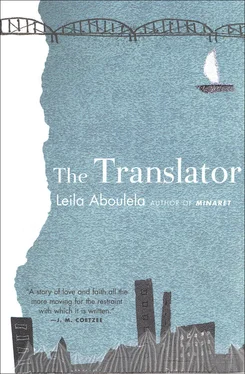‘I mean,’ he said, ‘if we get married this week, we could go away somewhere. There would be time because I don’t have to be back in Aberdeen until the middle of January. I was thinking of Aswan, have you been to Aswan?’
‘No.’ Her voice was a little subdued because she had remembered the bad voice.
‘I haven’t been there either,’ he said, watching her, the change of expression in her eyes. ‘The High Dam is near the town — Nasser’s big project. I’m told the south of Egypt is very much like here, in climate and terrain. It would be nice, what do you think?’
She smiled, ‘It would be nice.’
‘You could leave Amir with your aunt and then we can come back here and all go back together to Aberdeen.’
She nodded but it seemed to her complicated, going north and then coming back to Khartoum. ‘It would have been easier that day in Aberdeen, the day of the snow…,’ her voice trailed. It was the wrong thing to say. He would not want to talk about that day.
When he spoke, his voice was quiet, ‘In the Qur’an it says that pure women are for pure men… and I wasn’t clean enough for you then…’ He looked up towards the house and Sammar turned to look too. Dalia was walking down the steps of the porch, looking sleepy, her hair sticking out of her braids. She came and sat on the arm of Sammar’s chair and put her head on Sammar’s shoulder. She stared at Rae, too sleepy to be fully curious.
‘Are you still asleep?’ Sammar asked her, changing from explaining to Rae who Dalia was, into speaking Arabic. Dalia nodded and rubbed her nose.
‘Aren’t you going to shake hands?’
Dalia shook her head.
‘He knows Arabic,’ said Sammar. ‘You know Arabic, don’t you?’ she said to Rae.
‘A little, not very much,’ he said.
‘He can’t speak properly,’ Dalia whispered in Sammar’s ear and made her laugh.
‘He needs to practise more,’ she whispered back, ‘but you should be nice and say salamu alleikum.’
Dalia did, looking more awake, raising her hand a little.
‘Alleikum al-salaam,’ he replied. She smiled and sat up a little straighter. Her eyes caught sight of Amir’s bicycle, lying unwanted and available.
They watched her as she walked away from them, her housedress crumpled and too small, the zipper at the back a little undone. She rode the bicycle slowly, out of their view, round to the back of the house.
‘She will miss you,’ Rae said, something final in his voice. Clear to Sammar that she was really going to leave Khartoum and go back with him to Aberdeen. She was going to leave Dalia and not be close to her anymore, the day by day closeness, the eating, sleeping, closeness. She was going to take Amir away from his cousins, his grandmother, his house. She was going to take him to a place that was all grey, its noises muffled by clouds, a new school where they might not like him much, look at him in a surprised way. And she was going to leave this city, its dusty wind and smells.
‘If I was someone else, someone strong and independent I would tell you now, I don’t want to go back with you, I don’t want to leave my family, I love my country too much.’ Her voice was teasing and sad.
He did not look taken aback. ‘You’re not someone else,’ he said.
A fly dived silently over the tray and perched on the rim of the empty glass. Sammar leaned and waved it away.
‘It’s too late now,’ he said.
‘I know.’ She had been given the chance and she had not been able to substitute her country for him, anything for him.
‘Ours isn’t a religion of suffering,’ he said, ‘nor is it tied to a particular place.’ His words made her feel close to him, pulled in, closer than any time before because it was ‘ours’ now, not hers alone. And because he understood. Not a religion of pathos, not a religion of redemption through sacrifice.
He said, ‘I found out at the end, that it didn’t have anything to do with how much I’ve read or how many facts I’ve learned about Islam. Knowledge is necessary, that’s true. But faith, it comes direct from Allah.’
It was a miracle, she thought. Since getting Fareed’s letter she had been waking up in the middle of the night, smiling in the dark, stunned by what had happened, and finding herself unable to go back to sleep.
‘When you left,’ he said, ‘I thought if this isn’t enough incentive for me to convert, nothing is, and I felt sick, going around, here and there, no balance.’ Once, he said, he missed a flight to Paris. Another conference, another paper to present. He misread the gate number and he was late. He ran, out of breath, along corridors full of people coming back from holidays, cheerful suntans and children holding up big Mickey Mouse balloons. By the time he reached the correct gate, it was too late. He collapsed into a chair and took out his inhaler, to breathe, just to breathe and he watched his plane from the window, reversing and moving away.
‘It burned me up. All that running for nothing…’he laughed and put his face in his hands. When he looked up at her she was smiling at his description of the frantic corridors full of Mickey Mouse balloons.
Then the time he was ill, he said. Another asthma attack, gales in Aberdeen shaking the trees and him indoors unable to breathe. How long can a night be, how harsh without sleep? Sucking air that would not go in, not go inside. In this helpless state, in this humiliation, the need to pray. This was how it felt, neither lofty nor serene. Not a prayer for the good of humanity nor for success but just to breathe.
‘What I regret most,’ he said, ‘is that I used to write things like “Islam gives dignity to those who otherwise would not have dignity in their lives”, as if I didn’t need dignity myself.’
A fly hovered over the tray, buzzing. She waved it away.
He said, ‘I was a little taken aback. I didn’t think of myself as someone who would turn spiritual…’
‘I did. I used to feel that there was something inside you very heavy and still.’
‘The religious dimension that everyone has?’
‘Maybe.’ It had seemed to her as something asleep, fast asleep, not moving. Something she had wanted to come close to, stay near, breathing, until it woke.
He said, ‘At the end it was one step that I took, of wanting it for myself separate from the work, and then it all rushed to me. It felt like that.’
‘What does everyone in the department think about this,’ she asked. ‘Did you tell them?’
‘Yes… they think it’s mid-life crisis.’ He laughed a little and looked away at the cooperative across the road.
She frowned, worrying if in their eyes he had lost his credibility as a detached Middle-east observer. She told him that Yasmin once said, that if he converted it would be professional suicide.
‘I’ve already made a name for myself,’ he said. ‘Don’t worry. I’m not worried.’
He was right, she shouldn’t worry, provision came from Allah, it would come from Allah, she shouldn’t worry.
She said, ‘I admire you so much…’ and looked down at the grass. When she looked up there was kindness in his eyes and his voice.
Dalia was circling the house with her bicycle, the clatter of wheels on the cement of the car-port. She looked at Sammar and Rae then she disappeared again behind the house.
‘There’s a rat in my hotel room,’ he said. This made her laugh in disbelief and horror and ask, because she had forgotten to ask, which hotel he was staying in?
He named one of the older, more faded hotels overlooking the Nile. Not the best of hotels but still, one that should not have rats running about. He had heard the rat at night, along the wall, near the cupboard.
‘That’s terrible,’ she said, apologetic. This was her country after all, he was her guest.
Читать дальше












